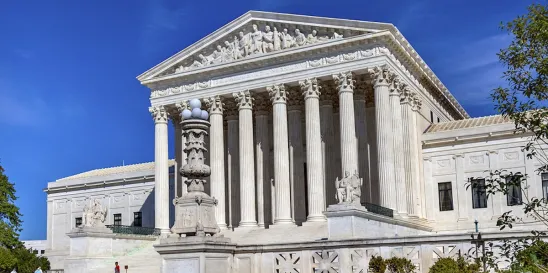On August 10, 2022, a petition for writ of certiorari filed by Whirlpool Financial Corporation & Consolidated Subsidiaries and Whirlpool International Holdings S.a.r.l. & Consolidated Subsidiaries (collectively, Whirlpool) was distributed to the Supreme Court of the United States for consideration at its upcoming conference on September 28, 2022.
As we have previously discussed, Whirlpool—supported by three amici—asked the Supreme Court to review the US Court of Appeals for the Sixth Circuit’s 2-1 decision that income earned by a Luxembourg controlled foreign corporation (CFC) was foreign base company sales income (FBCSI) under the branch rule of Internal Revenue Code (IRC) section 954(d)(2). The Sixth Circuit’s decision was based solely on its interpretation of IRC section 954(d)(2). Whirlpool’s petition and the three supporting amici briefs argue that the decision to focus solely on IRC section 954(d)(2) conflicts with regulations promulgated under IRC section 954(d)(2) (IRC section 954(d)(2) regulations) that taxpayers and their advisors have relied on for decades.
It remains to be seen whether Whirlpool’s petition will be granted, but taxpayers and their advisors would be well-served if the Supreme Court accepts the challenge and provides clarity on whether agencies and courts must follow validly promulgated regulations, particularly regulations that US Congress specifically directed be promulgated to provide guidance to taxpayers.
IN DEPTH
FACTUAL BACKGROUND
Whirlpool owned a Luxembourg CFC (Lux CFC) with one administrative employee located in Luxembourg. Lux CFC owned a Mexican disregarded entity (Mex DE) that manufactured products for the Lux CFC pursuant to a toll manufacturing services arrangement using seconded employees of a related Mexican CFC. Lux CFC sold the products to related persons. Lux CFC also owned the raw materials, work-in-process and finished goods, as well as the machinery and equipment used to manufacture the products—all of which were located in Mexico.
Mexico taxed the manufacturing service fee earned by the Mex DE. Under a Mexican Maquiladora incentive regime, Lux CFC was deemed to not have a taxable permanent establishment (PE) in Mexico, and thus, its income was not subject to taxation in Mexico. Luxembourg viewed Lux CFC as deriving its sales income through a Mexican PE and, under the income tax treaty with Mexico, taxed only income derived in Luxembourg for administrative services.
THE TAX COURT AND SIXTH CIRCUIT DECISIONS
The US Tax Court, in a published opinion issued in 2020, addressed the application of the FBCSI regulatory manufacturing branch rule to the income derived by Lux CFC. For this purpose, the Tax Court treated Lux CFC’s income from selling products to related persons as not FBCSI under the general rule of IRC section 954(d)(1) because it assumed that the manufacturing exception applied. However, it held that the income of Lux CFC not derived by the Mex DE was FBCSI under the IRC section 954(d)(2) regulations. Significantly, the Tax Court found that the regulations were validly promulgated.
The Sixth Circuit majority affirmed, focusing solely on its interpretation of IRC section 954(d)(2). Thus, the majority did not address the validity or requirements of the IRC section 954(d)(2) regulations. IRC section 954(d)(2) provides that if a CFC carries on activities through a foreign branch, the branch rule applies if the arrangement has “substantially the same effect as if such branch or similar establishment were a wholly owned subsidiary,” deriving the income attributable to the branch’s activities. The Sixth Circuit majority interpreted the language as applying when the CFC’s income is subject to deferral and then concluded that the amount of a CFC’s FBCSI under IRC section 954(d)(2) income is 100% of the CFC’s income, including the income of the manufacturing branch.
As we have previously discussed, the Sixth Circuit majority’s interpretation is contrary to the IRC section 954(d)(2) regulations. However, the majority indicates that, to the extent these narrow its interpretation of IRC section 954(d)(2), they are invalid. The dissent, on the other hand, would have applied the rules in the IRC section 954(d)(2) regulations and held that once it is concluded the branch rule applies, the amount of FBCSI would be determined by reapplying IRC section 954(d)(1), treating the branch as a separate CFC.
THE SUPREME COURT CERTIORARI STAGE
Whirlpool, supported by two amici, sought rehearing and rehearing en banc with the Sixth Circuit. However, both requests were denied. On June 30, 2022, Whirlpool filed a petition for a writ of certiorari, asking the Supreme Court to review the Sixth Circuit’s decision and provide guidance on “whether or in what circumstances a statute that is expressly conditioned on regulations to be promulgated by an agency may be enforced without regard to such regulations.” (For our prior discussion on the above, see here).
Whirlpool’s petition argued that the Sixth Circuit’s decision upsets the reliance interests of taxpayers who have relied on the IRC section 954(d)(2) regulations in structuring their operations for more than 50 years. The brief also argued that the Sixth Circuit’s decision will produce billions of dollars of unjustified tax liability and create two different tax regimes across the nation: one in the Sixth Circuit where FBCSI is determined based solely on the statute and one everywhere else where it is determined based on the statute and the regulations mandated by Congress.
The two amici who supported Whirlpool’s request for a rehearing with the Sixth Circuit, the National Association of Manufacturers(NAM) and the Silicon Valley Tax Directors Group(joined by the National Foreign Trade Council, the Information Technology Industry Council and TechNet) (collectively, Industry Group), submitted amicus briefs in support of Whirlpool’s petition with the Supreme Court. Additionally, PricewaterhouseCoopers LLP, Deloitte Tax LLP and KPMG LLP (collectively, Accounting Firms) joined forces to submit an amicus brief in support of Whirlpool to bring to the Supreme Court’s attention the “exceptionally important” nature of the case (the brief states that Ernst & Young LLP, the remaining member of the “Big 4,” did not participate because it is Whirlpool’s financial statement auditor).
NAM’s brief set forth two arguments. The first argument is that “the Sixth Circuit applied an entirely novel interpretation—not found anywhere in the Code or Treasury regulations and not advanced by the agency nor adopted by the Tax Court—that conflicts with decades-old regulations promulgated contemporaneously with the underlying statute and at Congress’s express command in section 954(d)(2) itself.” NAM explained that the Sixth Circuit expressly disregarded nearly 60-year-old regulations that have been applied continuously and consistently by the Internal Revenue Service and relied on by taxpayers. A logical extension of the decision would be to preclude taxpayers from relying on other regulatory rules that limit FBCSI under IRC section 954(d)(2). Thus, NAM requested that the Supreme Court intervene to prevent the Sixth Circuit’s approach from (1) exacerbating the hardships facing US manufacturers and (2) penalizing branch structures that NAM’s members have been operating for years.
The second argument is that “reliance on validly promulgated regulations—and therefore regulated parties’ ability to comply with the laws—is the bedrock of administrative law. If taxpayers must follow regulations or face the prospect of civil (and perhaps even criminal) penalties, then so too must the government be held to its binding, published actions.” Specifically, NAM argued that because the plain language of section 954(d)(2) mandates that taxpayers must apply additional rules provided “under regulations prescribed by the Secretary,” taxpayers must be able to rely on those rules when arranging their business affairs. Further, NAM’s members have for decades relied on the nearly 60-year-old regulations at issue in organizing their global matters. NAM explained that the Supreme Court has the precedent and justification to intervene and reject the Sixth Circuit’s approach, thus preventing further infringement on taxpayers’ reliance rights with respect to valid regulations. Finally, rejecting the Sixth Circuit’s approach would prevent the real possibility of subjecting NAM’s members to billions of dollars of unexpected and unjustified taxes.
The Industry Group’s brief argues that Congress specifically called for implementing regulations in the text of IRC section 954(d)(2). Such regulations were enacted almost immediately by the US Department of the Treasury and companies have spent hundreds of millions of dollars restructuring in reliance on such regulations. However, the Sixth Circuit’s “radical interpretation” focusing solely on IRC section 954(d)(2) casts doubt on decades of planning and reliance on such regulations. Further, the decision creates significant uncertainty about the future applicability of these long-standing regulations. Additionally, the decision creates a difference in tax regimes governing foreign sales income—one in the Sixth Circuit and one everywhere else. Such a discrepancy only compounds uncertainty for US taxpayers. Accordingly, the Industry Group concluded that the Supreme Court’s review and reversal of the Sixth Circuit’s decision is necessary to protect US multinational reliance interests on the long-standing regulations and maintain the ability for such US companies to effectively compete on a global scale.
Finally, the Accounting Firms’ brief asserts that Congress has enacted various IRC provisions dependent on “regulations prescribed by the Secretary.” Such provisions affect large swaths of US economic and everyday life and thus the question of whether IRC provisions, which are expressly conditioned on regulations, can be interpreted without regard to such regulations has implications far beyond the definition of FBCSI at issue in Whirlpool’s case. In order for the tax system to function properly, the Accounting Firms argued that taxpayers should be able to rely on the fact that regulations will be taken into account in the administrative and judicial interpretation of IRC provisions, especially those provisions whose effect is expressly conditioned on the issuance of such regulations. Taxpayers who use regulations to assist in complying with their code obligations have enormous reliance interests on those regulations being used to interpret and apply the statutory provisions pursuant to which they are promulgated. As such, the Accounting Firms requested that the Supreme Court grant Whirlpool’s petition to address the substantial uncertainty created by the “Sixth Circuit’s disregard of the [IRC Section 954(d)(2) regulations].”
Interestingly, the government took another approach. It submitted a waiver of “its right to file a petition in this case, unless requested to do so by the Court.” By doing so, the government avoided (at least for now) having to address any of Whirlpool’s or the amici’s arguments and taking a position on whether, or when, a court may limit its analysis to statutory text when Congress has specifically mandated the issuance of regulations and an agency has complied with such a mandate.
WHAT’S NEXT?
As noted above, Whirlpool’s petition is scheduled to be considered during the Supreme Court’s conference on September 28, 2022. Under Supreme Court Rule 10, “[r]eview on a writ of certiorari is not a matter of right, but of judicial discretion.” The primary reasons considered are:
-
A US Court of Appeals has entered a decision in conflict with the decision of another US Court of Appeals on the same important matter; has decided an important federal question in a way that conflicts with a decision by a state court of last resort; or has so far departed from the accepted and usual course of judicial proceedings, or sanctioned such a departure by a lower court, as to call for an exercise of this Court’s supervisory power
-
A state court of last resort has decided an important federal question in a way that conflicts with the decision of another state court of last resort or of a US Court of Appeals
-
A state court or a US Court of Appeals has decided an important question of federal law that has not been, but should be, settled by this Court, or has decided an important federal question in a way that conflicts with relevant decisions of this Court.
Under the Supreme Court’s customary rule, four out of the nine Supreme Court justices must vote to accept a case for a writ of certiorari to be granted. Most of the current justices participate in a “cert pool” as part of the decision process. In the “cert pool,” the clerks of the participating justices assign the petitions for a writ of certiorari amongst themselves and then prepare memorandums for the justices, recommending whether the Court should accept the case. If accepted, the case would be scheduled for briefing and oral argument.
Although the Supreme Court generally only accepts 100 to 150 out of the more than 7,000 petitions it is asked to review each year, Whirlpool and the amici have made a strong case for granting the petition. The issue of whether agencies and courts can ignore validly promulgated regulations—particularly those expressly mandated by Congress to provide guidance to the regulated public—is an important one. As illustrated by the amici, in a tax context, the issue impacts thousands of taxpayers and their advisors and involves billions of dollars. Additionally, the overall implications of the Sixth Circuit’s decision affects all regulated parties where there are regulations implementing a particular statute.







 />i
/>i
